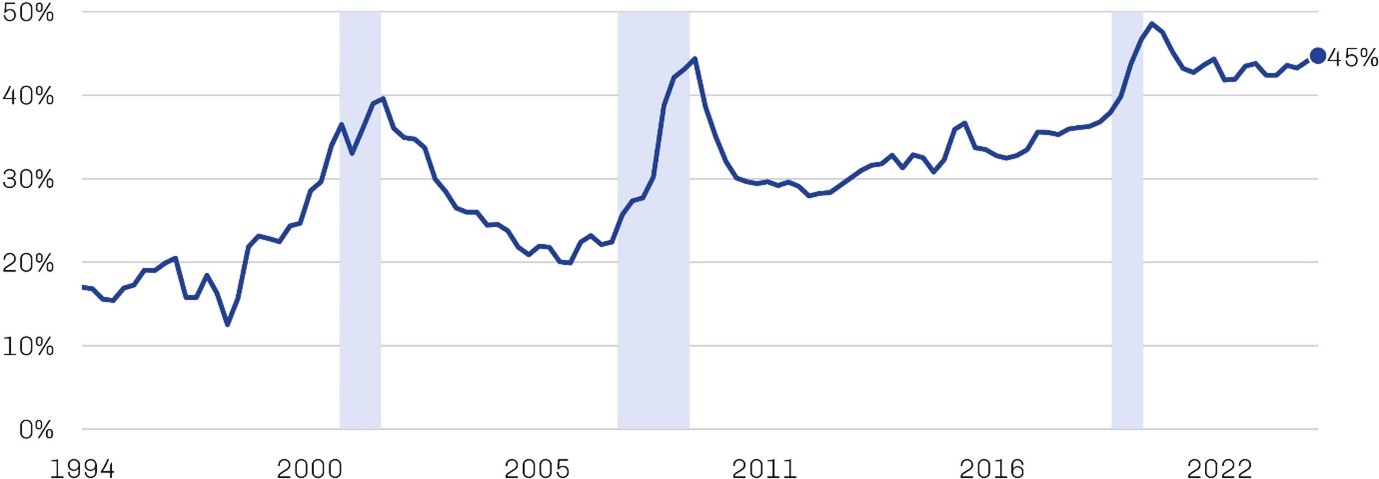July’s strong small-cap outperformance had us hoping that summer 2024 might finally mark a turning point of investor attention back to this market segment after a prolonged period of relative indifference.
Smaller stocks seemed poised to benefit from a sequence of macroeconomic developments that laid the ground for a Federal Reserve rate cut in September while raising hopes for a soft landing.
During July, the Russell 2000 Index subsequently surged 10.2%, outpacing the S&P 500 Index by 900 basis points. A promising sign, but one month does not make a durable rotation and smaller stocks spent the rest of the summer in a funk.
Performance dynamics tend to ebb and flow over time, as we know and have seen. Yet, while it’s been our experience that small-cap/large-cap leadership cycles tend to last approximately a decade, the current bout of small-cap underperformance has been in place since 2010.
We think this extended cycle is at least partly due to the Covid-19 pandemic and the substantial liquidity measures taken in response. Easy access to capital often leads to misallocation, with the resulting imbalances taking time to normalise. The proportion of unprofitable companies in the Russell 2000, for example, reached a historic high of nearly 50% in 2020 during a time when the impacts of pandemic-related shutdowns filtered into financial results.
In the four years since, this percentage has declined only marginally to a level that is very similar to its peak reached in the aftermath of the global financial crisis. Too many companies have been able to scurry along on the back of cheap financing, while investors in general have shown little interest in trying to differentiate between quality small cap names and the dross.
The number of money-losing companies in the Russell 2000 remains elevated
Percentage of Russell 2000 index companies with negative trailing-12-month earnings per share, Jan 1995 through Sep 2024

Source: FactSet, data as of 30 Sep 2024.
However, we are seeing some signs that the factors contributing to this long cycle of underperformance may be reversing. As a result of the sharpest rate-hike cycle in Federal Reserve history, capital now has a cost – albeit not one so high that credit fundamentals have been broadly impacted. Rates have rallied from their mid-year peaks in anticipation of Fed rate cuts.
The first cut which came to pass in September, at an outsized 50 basis points, should ease the burden of companies with floating-rate debt while lowering the cost of capital investment for all.
But we’ve seen that it is not sufficient for companies to merely remain solvent. The index’s underperformance shows that successful small businesses must demonstrate their potential for future earnings growth and economic resilience may help support this.
While we can’t predict whether a recession is on the horizon, the US economy has continued to expand despite tighter financial conditions that have prevailed for much of the past two years, with the labour market well supported and consumer metrics remaining solid.
However, there was little in the series of July/August conference calls with small-cap firms that suggests companies were overly concerned about the potential for recession or planning mass layoffs.
We were reminded over the summer that swift changes in the relative performance of small and large-cap stocks can often be a deke, reflecting nothing more than a mini-burst of excitement across a long slog of weakness.
A true shift in sentiment requires consistent buying interest from market participants who share our belief of undervaluation within small-caps. Often, the result is increased merger and acquisition activity. Strategic buyers, in particular, are often willing to pay attractive premiums for companies that have rationalised their cost structures, survived difficult times and maintained sound business models and balance sheets.
We have seen early signs of an uptick in takeout activity in the small-cap universe this year and are hopeful that continued interest from sophisticated buyers could call greater attention to the latent value we see in this market and finally help spark a turn of fortune. In the meantime, we remain focused on what we as investors can control: the stocks we invest in and the price we pay for them.
Bill Hench is head of the small-cap team and a portfolio manager at First Eagle Investments. The views expressed above should not be taken as investment advice.





